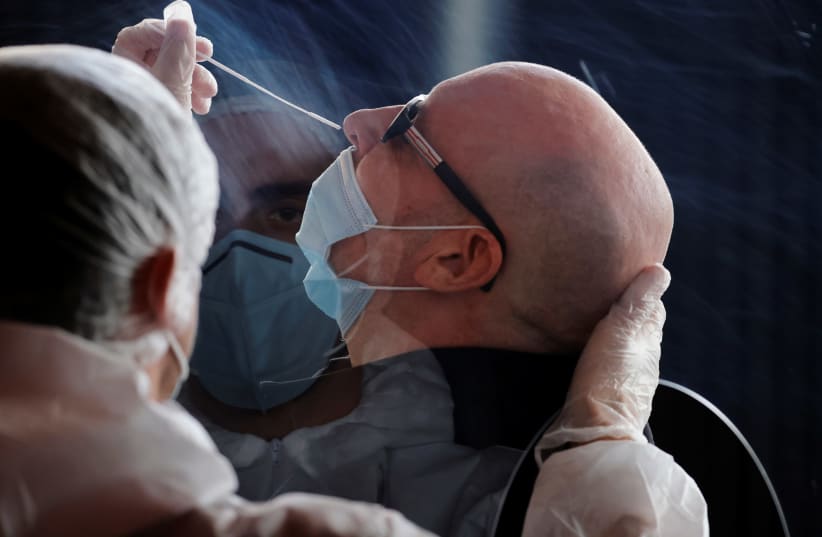Individuals who are not vaccinated are still much more likely to develop serious symptoms than those who were fully inoculated, data published by the Health Ministry on Sunday showed.
“In all age groups, those who are vaccinated and without any chronic conditions have a chance of developing a severe form of the disease that is half to one-third lower than those who are not inoculated,” said Prof. Nadav Davidovitch, director of Ben-Gurion University of the Negev’s School of Public Health, an epidemiologist and a member of the expert committee advising the ministry on the crisis.
“Regarding patients with chronic conditions, if they are not vaccinated they are about twice as likely to develop serious symptoms as those who are,” he added.
The ministry presented data according to age brackets for people age 40 years and older, considering the period between January and July.
Some 2,605 jabbed individuals between ages 40-49 with no preexisting conditions contracted the virus during this period. Of those, seven developed serious symptoms, or 0.3%, compared to 1.7% or 544 people of the 31,568 people who were not inoculated and got infected in the same period.
In addition, some 389 vaccinated patients with preexisting conditions got the virus, as well as 3,916 unvaccinated ones. Among the former group, some five people developed a serious disease, or 1.3%. Among the latter group, some 155 developed serious levels of the disease or 4%.
As far as the cohort for those in the 50-59 age group is concerned, some 17,847 unvaccinated individuals with no chronic conditions were infected, as well as 4,793 with chronic conditions. Of those, 658 and 363 developed serious symptoms, 3.7% and 7.6%, respectively.
In the same cohort, but among vaccinated individuals, only 0.6% of those with no preexisting conditions (10 out of 1,585) and 3.6% of those with preexisting conditions (19 out of 529) developed such symptoms.
Regarding individuals from the age 60-69 category, a total of 7,755 unvaccinated individuals with no preexisting conditions and 4,157 with preexisting conditions contracted the virus. The rate of patients who developed a serious disease was respectively 7.1%, or 551 people from the first larger group, and from the second smaller group there were 11.6% or 481 people.
Among those who were fully inoculated, there were 1,310 individuals with no preexisting conditions and 834 people who had preexisting conditions who became ill with serious symptoms; 2.2%, or 29 people, of the prior group and 5.5%, or 46 people, of the latter.
For ages 70-79, some 725 vaccinated people without background diseases were found positive for the virus and 41 of them developed serious morbidity – 5.7%. Among the unvaccinated, some 3,053 got sick and 17.1% developed serious symptoms – 522 people.
In addition, out of the 727 cases among vaccinated individuals with background diseases who got infected, some 80 turned serious, or 11%, compared to 20.6% of the 2,551 unvaccinated individuals with chronic conditions, for a total of 526 people.
Lastly, in the 80+ age cohort with no preexisting conditions, some 30.8% of unvaccinated individuals who got infected became severely sick – 626 out of 2,033; as opposed to 14.8% of vaccinated ones – 51 out of 344. For those with preexisting conditions, the rates have been, respectively 34.2% and 19.8%; 678 out of 1,981 for unvaccinated individuals and 98 out of 495 for vaccinated individuals.
“It is important to notice that we are talking about an observational study and not a clinical trial,” Davidovitch stressed.
“I think that the bottom line is that we see how vaccines are preventing severe cases and deaths, but they are not 100% effective and therefore they cannot be the only component to respond to the pandemic,” he added.
The data does not address the issue of how the time that elapses from the end of the vaccination process influences the protection.
“This is still under study,” the expert said.
Earlier in the day, Leumit Health Care Services published research suggesting that those who completed the inoculation over five months ago are twice as likely to get sick.
Leumit checked the data of some 28,000 members who have undergone a coronavirus test since June 1.
It found that in all age groups, those who had received their vaccines more than 142 days earlier were twice as likely to be infected as the median of those vaccinated later than that time.
Davidovitch said that he believes that before considering a booster for individuals who were inoculated earlier in the campaign, it would be better to wait until the vaccine is updated to be more effective against the Delta variant. 